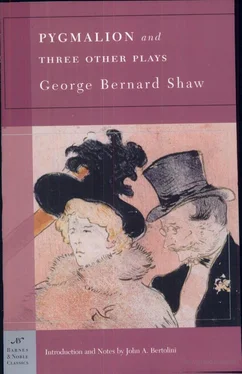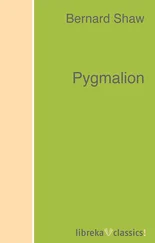No license is required to practice journalism.
Street in London where professional photographers had their shops.
Quotation from the Bible, Psalm 73:4-5 (KJV).
Of the dead [say] nothing but good (Latin).
Expensive shopping area in London.
Quotation from “The Latest Decalogue,” by English poet Arthur Hugh Clough (1819-1861).
English philologist and mathematician (1814-1890); an advocate of spelling reform.
Italian singer (1817 — 1895) who taught French in England and advocated a phonetic alphabet.
Institute founded in 1887 to conduct research into resources and raw materials of the British Empire, and to make the growing Empire understandable to the British people.
Reference to A Manual of Current Shorthand (1892).
Named after its inventor, Sir Isaac Pitman (1813-1897).
Amalthaea, the Sibyl of Cumae, was a legendary prophetess of ancient Rome who destroyed six of nine prophetic books when the Roman king refused to pay for them.
Robert Bridges, poet laureate of England (1913-1930) and author of Milton’s Prosody (1893), practiced spelling reform.
The valet who passes as a nobleman in Victor Hugo’s 1838 verse drama of the same name.
That is, “Two bunches of violets trod in the mud.”
Shaw later revised this phrase to “a romantic figure.”
Sixpence coin (slang).
Having turned them up due to the rain.
Detective.
That is, with soliciting for prostitution.
Police informant.
Slang expression equivalent to “damn me”; probably from “blind me.”
Hanwell County Asylum for the insane.
That is, worried and chased.
Working-class district of London; a slum area in the mid to late 1800s.
Peevish, or ill-natured.
Relating to the Pharisees, a sect often portrayed in the Bible as hypocritical.
Lamp chimneys are glass tubes around the wick of an oil lamp that keep the flame steady; flames in the tube that resonate to the human voice are called “singing flames.”
Used in the earliest phonographs as a medium for recording and replaying sound.
Portraits engraved on copper or steel; Higgins prefers their austerity to voluptuous color.
System of phonetic notation devised by English phonetician Henry Sweet (1845-1912).
Astonished; this Latinate word suits Higgins, who is a Milton aficionado (see note 7 for this play).
Pejorative word for a woman, ranging in meaning from a pert (saucy, or forward) woman to a prostitute.
Woman who wears a skirt that is dirty from being dragged over wet ground and who searches the street for usable things.
Strong scouring soap with a wrapper bearing the image of a monkey looking into a mirror.
London department store.
Off his head; crazy.
Crazy people.
Garbage man (sanitation worker).
Old-fashioned term for an immoral scoundrel.
Quotation from Milton’s “Il Penseroso”: “Sweet Bird that shunn‘st the noise of folly, / Most musicall, most melancholy!” (lines 61-62).
Manual laborer; ditch-digger.
Artists’ quarter in London.
English landscape painter (1851-1882), whose best-known work, “The Minister’s Garden,” was exhibited in 1878 at the Grosvenor Gallery in London.
After the English poet and painter Dante Gabriel Rossetti (1828-1882), who painted medieval religious and fantasy subjects.
Particular day reserved for casual visits from acquaintances.
That is, “How do you do?”
Area of low pressure.
Objectionable males.
Offensively dirty and badly behaved.
Crew’s quarters in a ship’s bow.
Loose-fitting jacket for wear when relaxing at home.
Love letter with a crest embossed on it; Pickering is speaking ironically.
Higgins is repeating a well-known saying by English theologian and logician Richard Whately (1787-1863).
Allusion to Mary Shelley’s 1818 novel Frankenstein, in which Dr. Frankenstein refers to the monster he creates as the “creature.”
Fireplace.
Jargon; insincere speech.
Resentment; indignation.
Slang for “ran away.”
Fellow; rascal.
Parody of “Rockefeller”; John D. Rockefeller (1839-1937) was an American industrialist and philanthropist.
That is, get money out of me.
Church where wealthy people married.
Horse-drawn closed carriage with the driver outside in front.
Higgins is explicitly identifying himself with Milton (see note 7 for this play).
Eleanor Gwynne (1650-1687), English actress and mistress of King Charles II.
Slang for a member of the upper class whose clothes indicate his status.
Condition of marriage whereby a widow can draw income from her husband’s estate.
New Testament book that recounts the proselytizing travels of Saints Peter and Paul.
Richard Porson (1759-1808) and Richard Bentley (1662-1742) were noted English classical scholars; Bentley, as Milton’s first editor, foolishly rewrote lines in Paradise Lost.
Lucius Cornelius Balbus (first century B.C.), Julius Caesar’s chief of engineers.
Air of superiority; pretentiousness.
John Scott Haldane (1860-1936), Scottish writer and physiologist.
One who believes evolution has direction and purpose; a follower of French philosopher Henri Bergson (1859-1941) or Shaw.
Читать дальше












